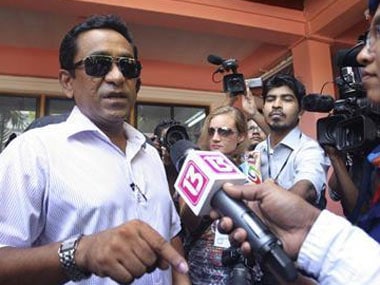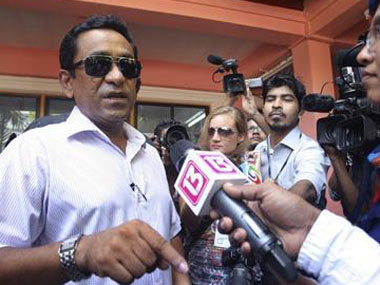By Seema Guha A cautious India is watching with dismay the turn of events in the Maldives and has remained silent on developments there. President Abdulla Yameen has imposed emergency in the island and removed and imprisoned vice president Ahmed Adeeb, a former favourite on allegedly trumped-up charges of plotting to kill Yameen. An explosion on board the Presidential speedboat, Finifenmaa last month gave Yameen the perfect excuse to raise the conspiracy bogey, slap emergency, and put political rival behind bars. The FBI which was also called in to investigate the explosion had said in its report that there was no evidence that an explosive device had triggered the blast. The explosion could have been caused by chemical or mechanical stowaway equipment in the speed boat the FBI said. Yameen, is a half brother of former strong man Maumoon Abdul Gayoom who ruled the Maldives from 1978 to 2008, with an iron fist. Gayoom had excellent relations with India, and in those early days the world accepted the president and did not bother much about democracy. Gayoom had arrested Mohammed Nasheed, than a young activist and kept him behind bars off and on for over 20 years. Now of course things have changed dramatically. The world swears by democracy. India prides itself in being the world¹s largest democracy, and had at one time was hand in glove with the US mission to encourage democracy across the world. [caption id=“attachment_1234297” align=“alignleft” width=“380”]  Maldivian President Abdulla Yameen. Reuters[/caption] Earlier, the first democratically elected president of Maldives, Mahmmod Nasheed was sentenced to 13 years imprisonment on charges of terrorism. India’s initial reaction after Nasheed’s sentencing was to call off Prime Minister Narendra Modi’s first visit to the Indian Ocean island country. In March this year Modi was to visit Seychelles, Mauritius, Maldives and Sri Lanka in an effort to bolster ties with its island neighbours as China expands its naval presence in the Indian Ocean. The opposition Maldives Democratic Party (MDP) welcomed the move. New Delhi’s action was then in perfect sync with the US, European Union and the rest of the free world. All these countries had roundly criticised the strong arm tactics of President Yameen and called for Nasheed’s release. In fact, after international criticism of the move, the authorities agreed to allow Nasheed to return home and remain under house arrest. But this was not to be. Soon afterwards Yameen changed his mind, sent Nasheed back to prison, dismissed Mohammed Jameel as vice president and got his protégé Adeeb to take over. Yameen had also removed his defence minister Colonel Nazim in January. And now the axe had fallen on Adeeb. On Thursday, the Parliament packed with Yameen supporters decided to impeach Adeeb on charges of plot to kill the President. India re-think after foreigners were allowed to buy land in Maldives Before the Adeeb incident, New Delhi did a quick rethink of its Maldives policy. After the Narendra Modi snub to Yameen, New Delhi decided to reach out to Male, mainly on strategic considerations. Foreign Minister Sushma Swaraj was in the Maldives on 10 and 11 October for a joint commission meeting. After batting for democracy and protesting the harsh treatment meted out to Nasheed, New Delhi had a change of heart. The change had much to do with China’s growing footprints in the island, which is literally in India’s backyard. Alarm bells rang in New Delhi when President Yameen announced in July that foreigners who invest more than $1bn in the island could own land in perpetuity, provided 70 percent of it is reclaimed from the sea. China expertise in churning sand from the ocean bed has been recently well demonstrated in the South China Sea. It also has deep pockets. The announcement in July had India’s antennae up, as New Delhi knows that China can well use this to strengthen its naval presence further in the Indian Ocean. By standing on a moral high ground and batting for democracy and the right cause, New Delhi would be in danger of allowing Maldives to swing even more towards China. Recalls China filling in the vacuum in Myanmar Officials remember what happened in Myanmar after the 1988 pro-democracy uprising by students for ouster of military dictators from Yangon. India wholeheartedly supported the National League for Democracy and bitterly criticised the crackdown. Thousands of activists fled to India. In the 1990 elections when Aung San Suu Kyi’s NLD had an outright victory, the military junta refused to accept the results. The junta placed Suu Kyi under house arrest, filled the nation’s prisons with party leaders and workers and abrogated the constitution. As New Delhi cold shouldered the military junta, China stepped in to fill the void. The pervading influence of China, made then Congress prime minister PV Narasimha Rao change track. His government began building links with the military to counter China. Aung Sang Suu Kyi was disappointed but India’s strategic interests dictated that action. Similar considerations are at present guiding New Dehi’s policy in the Maldives. It is monitoring the situation carefully and watching from the sidelines for now.
Alarm bells rang in New Delhi when President Yameen announced in July that foreigners who invest more than $1bn in the island could own land in perpetuity, provided 70 percent of it is reclaimed from the sea.
Advertisement
End of Article
Written by FP Archives
see more


)

)
)
)
)
)
)
)
)



